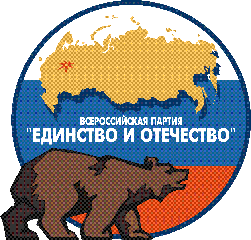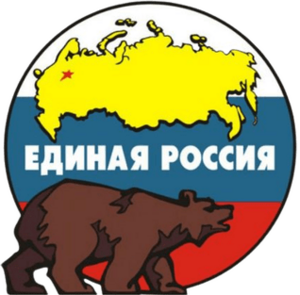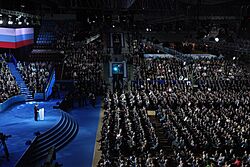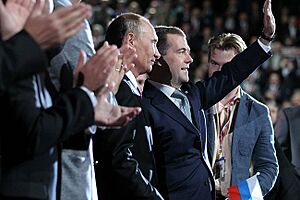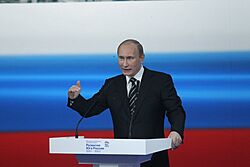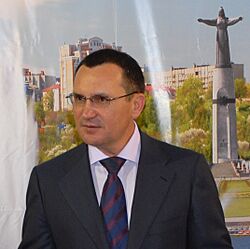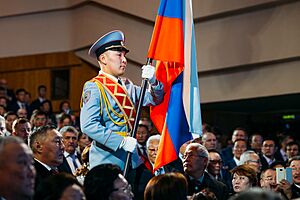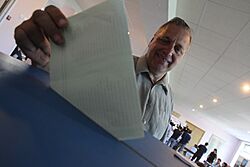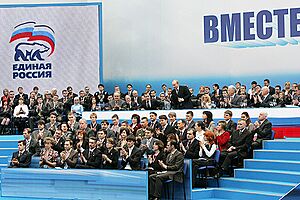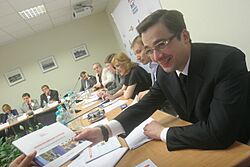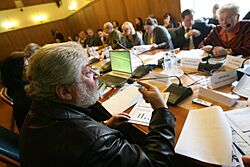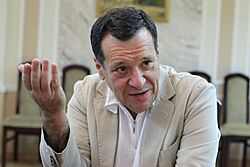United Russia facts for kids
Quick facts for kids
United Russia
Единая Россия
|
|
|---|---|
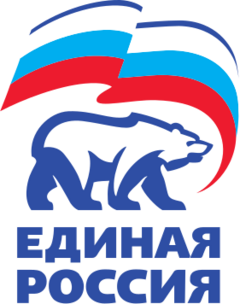 |
|
| Chairman | Dmitry Medvedev |
| Secretary-General | Vladimir Yakushev |
| Chairman of the Supreme Council |
Boris Gryzlov |
| Parliamentary Leader | Vladimir Vasilyev |
| Founders |
|
| Founded | 1 December 2001 |
| Merger of |
|
| Headquarters | 39th Building, Kutuzovsky Prospekt, Moscow, Russia. 121170 |
| Youth wing | Young Guard of United Russia |
| Membership (2013) | 2,073,772 |
| Ideology |
|
| Political position | Big tent |
| National affiliation | All-Russia People's Front |
| European affiliation | European Democrat Group (formerly) |
| International affiliation | For the Freedom of Nations! |
| Colours | White, Blue, Red (Russian national colors) |
| Seats in the Federation Council |
136 / 178
|
| Seats in the State Duma |
319 / 450
|
| Governors |
83 / 89
|
| Seats in the Regional Parliaments |
2,682 / 3,980
|
| Ministers |
20 / 31
|
|
^ A: United Russia does not have a coherent ideology but has been described by various sources as centrist, centre-right, or right-wing. United Russia also expresses support for far-right parties in Europe. |
|
The All-Russian Political Party United Russia (Russian: Всероссийская политическая партия «Единая Россия», romanized: Vserossiyskaya politicheskaya partiya "Yedinaya Rossiya") is the main political party in Russia. It is often called the "ruling party" because it holds the most power. It is the largest party in the Russian Federation.
As of 2022, United Russia holds 325 out of 450 seats in the State Duma, which is Russia's main law-making body. This means they have a strong majority. The party was created on December 1, 2001. It was formed when three other parties, Unity, Fatherland – All Russia, and Our Home – Russia, joined together.
United Russia has had a very strong presence in the State Duma since 2007. They have won enough seats to pass laws easily. In the 2011 elections, the party's list of candidates was led by Dmitry Medvedev, who was President at the time. For the 2012 presidential election, Vladimir Putin became their candidate.
The party supports the policies of President Vladimir Putin. Even though he is not officially the party leader or a member now, many see him as its true leader. United Russia's popularity was highest in 2007. The party's ideas are sometimes seen as flexible. They are often called a "big-tent party" because they welcome people with different views.
Contents
History of United Russia
How the Party Started
United Russia grew out of a group called the Unity bloc. This group was formed in 1999, just before elections. Its goal was to challenge another strong party at the time. The government supported Unity's creation. They didn't expect it to do very well at first.
Sergei Shoigu, a well-known minister, became the leader of Unity. At that time, Prime Minister Vladimir Putin's support grew a lot. This happened after he sent troops into Chechnya in response to bombings. The war effort was very popular with the public.
In the 1999 election, Unity did surprisingly well. It received 23.3% of the votes. This success showed that Putin was likely to win the 2000 presidential election.
Forming the Party
After the 1999 elections, Unity became a permanent political party. Many independent lawmakers joined it. In 2001, Unity and another group, Fatherland – All Russia, decided to merge. In December 2001, they officially became the All-Russian Party of Unity and Fatherland—United Russia.
Instead of focusing on old political arguments, Putin emphasized "stability." This was something many Russians wanted after a decade of big changes. People felt that Putin had brought stability to the country.
Early Years (2001–2003)
After the merger, leaders like Sergei Shoigu and Yury Luzhkov became co-chairs. Boris Gryzlov became the chairman of the Supreme Council in 2002. By 2003, United Russia had over 250,000 members.
In March 2003, the party held its second meeting. They approved a plan called "The Path of National Success." In December 2003, United Russia won the elections. They received 37.57% of the votes. This gave them a strong majority in the 4th State Duma. Boris Gryzlov became the speaker of the State Duma.
The party also decided to change its name to simply "United Russia."
Success in 2003 Elections
During Putin's early years as president, Russia's economy grew a lot. This was helped by high prices for oil and gas. United Russia's strong position in the Duma helped Putin pass many important changes. These included a flat income tax and other economic reforms.
United Russia presented itself as fully supporting Putin's plans. This helped them win the 2003 elections. The party was good at gaining support and weakening its opponents. For example, they highlighted issues with other parties. The main opposition parties did not do well in these elections.
Growing Power (2004–2007)
In 2004, Boris Gryzlov was elected chairman of United Russia. The party worked to make sure its members held important government positions. By 2006, 66 out of 88 regional leaders were members of the party. Many leaders of large companies also joined.
In 2006, the party approved a new plan called "The Russia We Choose." This plan focused on "sovereign democracy." United Russia also helped create new groups. These included the Young Guard of United Russia and the Union of Pensioners of Russia. These groups aimed to help different parts of society.
2007 Elections
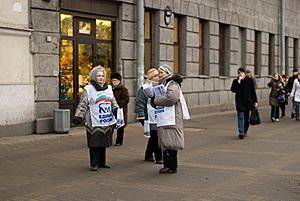
As the economy continued to improve, Putin's approval ratings stayed high. He won the 2004 presidential election with over 71% of the votes. In the 2007 Duma elections, United Russia won 64.3% of the votes. Putin's name was at the top of United Russia's list.
The party also made it harder for other parties to register and participate in elections. After the 2007 elections, the party focused on anti-terrorism laws and social spending.
Later Years (2008–2010)
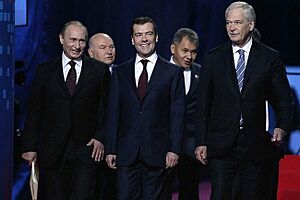
For the 2008 presidential election, United Russia supported Dmitry Medvedev. He won easily. Medvedev then made Putin his Prime Minister. In April 2008, Putin became the party's leader, but he did not become a member.
In regional elections in 2009, United Russia won most seats. There were some claims that opposition candidates faced difficulties. In September 2010, Yury Luzhkov, the mayor of Moscow, left the party.
Recent Years (2011–2013)
Between 2010 and 2011, support for United Russia changed but generally went down. At a party meeting in September 2011, Medvedev supported Putin running for president in 2012. This meant Putin would likely become president again. Medvedev also agreed to lead United Russia in the Duma elections.
The party approved its list of candidates for the December 2011 elections. This list included many party members and some non-members. Medvedev led the party's list. The party's election plan was announced by Medvedev and Putin. They talked about improving the economy, raising salaries, and building more roads.
In May 2012, Medvedev was elected chairman of United Russia. In March 2013, some members left the party. They said the party was not doing its job well.
All-Russia People's Front
In May 2011, Vladimir Putin suggested creating the All-Russia People's Front (ONF). This was a group to bring together different public organizations. Members of the ONF were included in United Russia's list for the 2011 Duma elections.
Putin said the ONF would help unite different groups. He wanted it to be a way for people to work together to make the country better. Boris Gryzlov said it was a step to bring United Russia and other groups closer.
The ONF included over 500 public organizations. Many people also joined as individuals. The ONF's plan for the country was developed and adopted by the party. Some people felt that creating the ONF went against the idea of keeping politics separate from public life.
Recent Developments (2014–Present)
In February 2016, United Russia held a meeting to approve how they would choose candidates for the upcoming elections. In May 2016, they held party elections, called "primaries." However, winning these primaries did not always mean a person would become a candidate. Some winners were replaced by others.
More than 20 people who didn't take part in the primaries were still chosen as candidates. In January 2017, Medvedev was re-elected as party chairman.
In May 2019, the party used electronic voting for the first time to choose candidates. In the 2021 Duma elections, the party kept its strong majority. This happened even though polls before the election showed lower support for the party.
In March 2022, during the conflict in Ukraine, the party opened an aid center in Mariupol. In December 2022, the European Union placed sanctions on United Russia. This was because the EU believed the party supported actions that harmed Ukraine's independence.
Elections and Results
State Duma Elections
United Russia has taken part in all elections for the State Duma of the Russian Federation since 2003. Before that, its earlier groups participated. The party often used a strategy of including well-known people on its lists. These people sometimes did not plan to become lawmakers or gave up their seats after the election. This allowed less famous party members to take their places.
2003 State Duma Elections
The 2003 elections were the first where United Russia ran as a single party. They won 223 seats in parliament. This gave them a strong majority. Boris Gryzlov, Sergei Shoigu, and Yuri Luzhkov led the party's list. Voter turnout was 55.75%.
2007 State Duma Elections
The 2007 elections were held in December. United Russia won 315 seats, giving them an even stronger majority. For the first time, elections were only based on party lists, not individual candidates.
Vladimir Putin was the only name at the top of United Russia's list. He announced he would lead the list but would not join the party. United Russia did not take part in all televised debates. Their election plan was called "Putin's Plan: A Worthy Future for a Great Country." Voter turnout was 63.78%.
2011 State Duma Elections
The 2011 elections were held in December. For the first time, the State Duma was elected for five years. United Russia won 238 seats. President Medvedev led the party's list. Voter turnout was 60.1%.
United Russia also took part in televised debates for the first time. However, top leaders like Putin and Medvedev did not participate in these debates.
2016 State Duma Elections
The 2016 elections were held in September. This time, half the lawmakers were elected from party lists and half from individual districts. Dmitry Medvedev, the party chairman, again led the party's list.
United Russia won 343 seats, their highest number ever. This gave them a very strong majority. Voter turnout was 47.88%.
2021 State Duma Elections
The 2021 elections were held over three days in September. They also used a mixed system of party lists and individual districts. President Vladimir Putin suggested including several important figures on the party's list. These included Defense Minister Sergei Shoigu and Foreign Minister Sergei Lavrov.
United Russia was the only party to hold "primaries" to choose its candidates. Millions of people took part in this internal voting, many online. The party's plan for these elections was called the "People's Programme." It was based on ideas from President Putin and suggestions from over 2 million Russians.
The party also focused on bringing in new faces. Many volunteers and social activists became candidates. Voter turnout was 51.72%. United Russia won 324 seats, keeping its strong majority.
Presidential Election Results
United Russia has supported the winning candidate in every presidential election since 2004.
| Election | Candidate | First round | Second round | Result | ||
|---|---|---|---|---|---|---|
| Votes | % | Votes | % | |||
| 2004 | Supported Vladimir Putin | 49,565,238 | 71.31 | N/A | Won | |
| 2008 | Dmitry Medvedev | 52,530,712 | 70.28 | N/A | Won | |
| 2012 | Vladimir Putin | 46,602,075 | 63.60 | N/A | Won | |
| 2018 | Supported Vladimir Putin | 56,430,712 | 76.69 | N/A | Won | |
| 2024 | Supported Vladimir Putin | 76,277,708 | 88.48 | N/A | Won | |
State Duma Election Results
| Election | Leader | Votes | % | Seats | +/– | Rank | Government |
|---|---|---|---|---|---|---|---|
| 2003 | Boris Gryzlov | 22,779,279 | 37.57 |
223 / 450
|
Majority | ||
| 2007 | 44,714,241 | 64.20 |
315 / 450
|
Supermajority | |||
| 2011 | Vladimir Putin | 32,379,135 | 49.32 |
238 / 450
|
Majority | ||
| 2016 | Dmitry Medvedev | 28,527,828 | 54.20 |
343 / 450
|
Supermajority | ||
| 2021 | Sergey Shoigu | 28,064,258 | 49.82 |
324 / 450
|
Supermajority |
Regional Election Results
| Regional parliament | Election year and number of seats | Current place | Next elections | ||||||||||||
|---|---|---|---|---|---|---|---|---|---|---|---|---|---|---|---|
| Places | % | # | |||||||||||||
| 2011 | 2012 | 2013 | 2014 | 2015 | 2016 | 2017 | 2018 | 2019 | 2020 | 2021 | |||||
Parliament of the Chechen Republic |
37 | 37 |
37 |
37 |
37 / 41
|
90.2% | #1 | 2026 | |||||||
State Assembly of the Republic of Mordovia |
44 | 45 |
42 |
42 / 48
|
87.5% | #1 | 2026 | ||||||||
People's Assembly of the Republic of Ingushetia |
22 | 26 |
27 |
27 / 32
|
84.4% | #1 | 2026 | ||||||||
Duma of Khanty-Mansi Autonomous Okrug — Yugra |
25 | 28 |
29 |
29 / 35
|
82.9% | #1 | 2026 | ||||||||
Legislative Assembly of Nizhny Novgorod Oblast |
30 | 41 |
40 |
40 / 50
|
80% | #1 | 2026 | ||||||||
State Council of the Republic of Adygea |
41 | 39 |
40 |
40 / 50
|
80% | #1 | 2026 | ||||||||
Tambov Oblast Duma |
42 | 44 |
42 |
40 / 50
|
80% | #1 | 2026 | ||||||||
Tyumen Oblast Duma |
38 | 39 |
38 |
38 / 48
|
79.2% | #1 | 2026 | ||||||||
Duma of Stavropol Krai |
37 | 39 |
39 |
39 / 50
|
78% | #1 | 2026 | ||||||||
People's Assembly of the Republic of Dagestan |
62 | 72 |
69 |
69 / 90
|
76.7% | #1 | 2026 | ||||||||
Legislative Assembly of the Jewish Autonomous Oblast |
14 | 13 |
14 |
14 / 19
|
73.7% | #1 | 2026 | ||||||||
Duma of Chukotka Autonomous Okrug |
7 | 10 |
11 |
11 / 15
|
73.3% | #1 | 2026 | ||||||||
Pskov Oblast Assembly of Deputies |
26 | 33 |
19 |
19 / 26
|
73.1% | #1 | 2026 | ||||||||
Legislative Assembly of Tver Oblast |
26 | 31 |
29 |
29 / 40
|
72.5% | #1 | 2026 | ||||||||
Legislative Assembly of Kaliningrad Oblast |
22 | 29 |
29 |
29 / 40
|
72.5% | #1 | 2026 | ||||||||
Moscow Oblast Duma |
29 | 38 |
36 |
36 / 50
|
72% | #1 | 2026 | ||||||||
Samara Regional Duma |
34 | 40 |
36 |
36 / 50
|
72% | #1 | 2026 | ||||||||
Novgorod Oblast Duma |
15 | 21 |
23 |
23 / 32
|
71.9% | #1 | 2026 | ||||||||
Legislative Assembly of Vologda Oblast |
21 | 25 |
24 |
24 / 34
|
70.6% | #1 | 2026 | ||||||||
Legislative Assembly of Leningrad Oblast |
31 | 40 |
35 |
35 / 50
|
70% | #1 | 2026 | ||||||||
Kursk Oblast Duma |
33 | 35 |
31 |
31 / 45
|
68.9% | #1 | 2026 | ||||||||
Murmansk Oblast Duma |
22 | 25 |
25 |
25 / 36
|
69.4% | #1 | 2026 | ||||||||
State Council of the Chuvash Republic |
33 | 35 |
30 |
30 / 44
|
68.2% | #1 | 2026 | ||||||||
Legislative Assembly of Amur Oblast |
17 | 25 |
18 |
18 / 27
|
66.7% | #1 | 2026 | ||||||||
Legislative Assembly of Perm Krai |
39 | 40 |
40 |
40 / 60
|
66.7% | #1 | 2026 | ||||||||
Legislative Assembly of Sverdlovsk Oblast |
29 | 35 |
33 |
33 / 50
|
66% | #1 | 2026 | ||||||||
Legislative Assembly of Krasnoyarsk Krai |
33 | 37 |
34 |
34 / 52
|
65.4% | #1 | 2026 | ||||||||
Legislative Duma of Tomsk Oblast |
27 | 31 |
27 |
27 / 42
|
64.3% | #1 | 2026 | ||||||||
Legislative Assembly of Kamchatka Krai |
22 | 21 |
18 |
18 / 28
|
64.3% | #1 | 2026 | ||||||||
Duma of Astrakhan Oblast |
42 | 36 |
27 |
27 / 44
|
61.7% | #1 | 2026 | ||||||||
Legislative Assembly of Orenburg Oblast |
32 | 34 |
29 |
29 / 47
|
61.7% | #1 | 2026 | ||||||||
Legislative Assembly of the Republic of Karelia |
19 | 24 |
22 |
22 / 36
|
61.1% | #1 | 2026 | ||||||||
Legislative Assembly of Kirov Oblast |
27 | 37 |
24 |
24 / 40
|
60% | #1 | 2026 | ||||||||
Legislative Assembly of Saint Petersburg |
20 | 36 |
30 |
30 / 50
|
60% | #1 | 2026 | ||||||||
Legislative Assembly of Omsk Oblast |
27 | 29 |
26 |
26 / 44
|
59.1% | #1 | 2026 | ||||||||
Legislative Assembly of Primorsky Krai |
23 | 25 |
23 |
23 / 40
|
57.5% | #1 | 2026 | ||||||||
Lipetsk Oblast Council of Deputies |
36 | 45 |
23 |
23 / 42
|
54.8% | #1 | 2026 | ||||||||
Oryol Oblast Council of People's Deputies |
31 | 34 |
27 |
27 / 50
|
54% | #1 | 2026 | ||||||||
Altai Krai Legislative Assembly |
48 | 42 |
31 |
31 / 68
|
45.6% | #1 | 2026 | ||||||||
Belgorod Oblast Duma |
11 | 29 |
44 |
44 / 50
|
88% | #1 | 2025 | ||||||||
Voronezh Oblast Duma |
48 | 51 |
48 |
48 / 56
|
85.7% | #1 | 2025 | ||||||||
Legislative Assembly of the Yamalo-Nenets Autonomous Okrug |
18 | 18 |
18 |
18 / 22
|
81.8% | #1 | 2025 | ||||||||
Kurgan Oblast Duma |
22 | 28 |
27 |
27 / 34
|
79.4% | #1 | 2025 | ||||||||
Magadan Oblast Duma |
5 | 17 |
16 |
16 / 21
|
76.2% | #1 | 2025 | ||||||||
Legislative Assembly of Kaluga Oblast |
22 | 31 |
29 |
29 / 40
|
72.5% | #1 | 2025 | ||||||||
Ryazan Oblast Duma |
25 | 32 |
29 |
29 / 40
|
72.5% | #1 | 2025 | ||||||||
Kostroma Oblast Duma |
26 | 27 |
24 |
24 / 35
|
68.6% | #1 | 2025 | ||||||||
State Council of the Komi Republic |
25 | 24 |
20 |
20 / 30
|
66.7% | #1 | 2025 | ||||||||
Legislative Assembly of Novosibirsk Oblast |
50 | 50 |
45 |
45 / 76
|
59.2% | #1 | 2025 | ||||||||
Great Khural of Tuva |
29 | 31 |
30 |
30 / 32
|
93.8% | #1 | 2024 | ||||||||
Tula Oblast Duma |
31 | 33 |
31 |
31 / 36
|
86.1% | #1 | 2024 | ||||||||
State Council of the Republic of Tatarstan |
87 | 83 |
85 |
85 / 100
|
85% | #1 | 2024 | ||||||||
Bryansk Oblast Duma |
47 | 55 |
48 |
48 / 60
|
80% | #1 | 2024 | ||||||||
State Council of Crimea |
0 | 70 |
60 |
60 / 75
|
80% | #1 | 2024 | ||||||||
Parliament of the Kabardino-Balkarian Republic |
52 | 50 |
50 |
50 / 70
|
71.4% | #1 | 2024 | ||||||||
Volgograd Oblast Duma |
? | 32 |
28 |
27 |
27 / 38
|
71.1% | #1 | 2024 | |||||||
State Assembly of the Mari El Republic |
44 | 46 |
33 |
35 |
35 / 50
|
70% | #1 | 2024 | |||||||
People's Assembly of Karachay-Cherkessia |
29 | 37 |
34 |
34 / 50
|
68% | #1 | 2024 | ||||||||
State Assembly of the Altai Republic |
23 | 30 |
25 |
25 / 41
|
61% | #1 | 2024 | ||||||||
Assembly of Deputies of the Nenets Autonomous Okrug |
6 | 13 |
11 |
11 / 19
|
57.9% | #1 | 2024 | ||||||||
Legislative Assembly of Sevastopol |
0 | 22 |
14 |
14 / 28
|
50% | #1 | 2024 | ||||||||
Moscow City Duma |
32 | 38 |
24 |
20 |
20 / 45
|
44.4% | #1 | 2024 | |||||||
Legislative Duma of Khabarovsk Krai |
18 | 30 |
2 |
5 |
5 / 36
|
13.9% | #2 | 2024 | |||||||
Legislative Assembly of Kemerovo Oblast |
17 | 44 |
39 |
39 / 46
|
84.8% | #1 | 2023 | ||||||||
People's Khural of Kalmykia |
17 | 18 |
21 |
21 / 27
|
77.8% | #1 | 2023 | ||||||||
Legislative Assembly of Rostov Oblast |
20 | 52 |
46 |
46 / 60
|
76.7% | #1 | 2023 | ||||||||
State Assembly of the Republic of Bashkortostan |
55 | 88 |
79 |
78 |
78 / 110
|
70.9% | #1 | 2023 | |||||||
State Assembly of the Sakha Republic |
20 | 51 |
42 |
47 |
47 / 70
|
67.1% | #1 | 2023 | |||||||
Yaroslavl Oblast Duma |
15 | 39 |
32 |
32 / 50
|
64% | #1 | 2023 | ||||||||
People's Khural of the Republic of Buryatia |
22 | 45 |
39 |
39 / 66
|
59.1% | #1 | 2023 | ||||||||
Legislative Assembly of Vladimir Oblast |
27 | 32 |
23 |
22 |
22 / 38
|
57.9% | #1 | 2023 | |||||||
Ivanovo Oblast Duma |
15 | 22 |
15 |
15 / 26
|
57.7% | #1 | 2023 | ||||||||
Smolensk Oblast Duma |
15 | 36 |
26 |
26 / 48
|
54.2% | #1 | 2023 | ||||||||
Arkhangelsk Oblast Assembly of Deputies |
? | 43 |
25 |
25 / 47
|
53.2% | #1 | 2023 | ||||||||
Legislative Assembly of Ulyanovsk Oblast |
10 | 31 |
17 |
17 / 36
|
47.2% | #1 | 2023 | ||||||||
Legislative Assembly of Zabaykalsky Krai |
14 | 36 |
21 |
21 / 50
|
42% | #1 | 2023 | ||||||||
Supreme Council of the Republic of Khakassia |
53 | 34 |
17 |
21 |
21 / 50
|
42% | #1 | 2023 | |||||||
Legislative Assembly of Irkutsk Oblast |
15 | 29 |
17 |
17 / 45
|
37.8% | #2 | 2023 | ||||||||
Legislative Assembly of Penza Oblast |
12 | 34 |
32 |
32 / 36
|
88.9% | #1 | 2022 | ||||||||
Legislative Assembly of Krasnodar Krai |
25 | 95 |
60 |
60 / 70
|
85.7% | #1 | 2022 | ||||||||
Saratov Oblast Duma |
14 | 43 |
36 |
36 / 45
|
80% | #1 | 2022 | ||||||||
State Council of the Udmurt Republic |
31 | 67 |
47 |
47 / 60
|
78.3% | #1 | 2022 | ||||||||
Sakhalin Oblast Duma |
11 | 21 |
19 |
20 |
20 / 28
|
71.4% | #1 | 2022 | |||||||
Parliament of the Republic of North Ossetia–Alania |
25 | 45 |
46 |
46 / 70
|
65.7% | #1 | 2022 | ||||||||
Choosing Candidates (Primaries)
United Russia holds "preliminary voting," also known as "primaries." This is an internal party election to choose candidates for future elections. It allows regular citizens to take part in the party's political life.
In 2011, United Russia and the ONF held primaries for the first time. Over 150 non-party candidates were included in United Russia's election lists. This success led Vladimir Putin to suggest making primaries a required step for all political parties. Since 2016, United Russia has held primaries every year. In 2021, they introduced electronic voting for six days. United Russia is still the only party that uses this preliminary voting system.
Electronic Voting
Electronic preliminary voting is a way to vote remotely. A special website was created for this, which works on smartphones. This site allows candidates to share their news and photos. It also makes it easier to watch the voting process.
In 2021, United Russia's electronic voting took place online from May 24 to May 30. Over 6 million people participated in this online voting. To vote, people had to log in through a government portal. The party created special software to help monitor the electronic voting and prevent problems.
What United Russia Believes In
The party says its main ideas are centrism and Russian conservatism. This means they believe in a strong government and practical solutions. Researchers also say the party supports ideas like statism (strong government control) and Putinism (supporting Vladimir Putin's policies).
According to their 2003 plan, "The Path of National Success," the party wants to bring together different groups in the country. Their goal is to reduce the gap between rich and poor. They believe the economy should mix government rules with market freedoms. They want the benefits of growth to help those who are less fortunate.
The party does not support extreme left-wing or right-wing ideas. Instead, they aim for a "political centrism" that can unite everyone. They also focus on being practical and avoiding extreme actions. The party sees itself as continuing Russia's long history of strong government. Their motto is "the party of real deeds."
In 2005, Boris Gryzlov said United Russia was choosing a "socially conservative" path. He said they were against both old communist ideas and extreme liberal ideas. Since 2006, many party leaders have used the term "sovereign democracy." This idea means that Russia should have its own unique form of democracy, independent from other countries.
The party strongly supports the current government and president. In the 2007 elections, their slogans supported Vladimir Putin's plans. In 2009, they officially declared Russian conservatism as their main idea.
The party's plan says that people are their top priority. They believe in human rights, freedom of speech, and access to culture. They want to make sure everyone has a good job and social security.
United Russia has also worked closely with the Russian Orthodox Church. The Church supports the government's policies. In 2015, United Russia changed its main idea to liberal conservatism. This is a more center-right approach. This change happened during an economic downturn in Russia.
The party's current rules list its main values:
- Well-being of people: This includes health, long life, good pay, and a comfortable environment.
- Unity and independence of the country: This means valuing common history, peace between different groups, and protecting Russia from outside interference.
- Leadership and development of Russia: This involves improving people's lives, education, science, and the economy.
To follow these values, the party aims to:
- Be a team working to improve people's lives and develop the country.
- Be the party of most citizens who support the President.
- Represent citizens' interests in government openly and honestly.
- Make sure government tasks and laws are followed.
- Support new ideas and projects from business people, scientists, and young leaders.
- Protect human dignity and fairness in society.
United Russia has different groups within it. These include a socially conservative group and a liberal-conservative group. They also have a national-conservative group. These groups are like debate clubs within the party.
"Putin's Plan"
"Putin's Plan" is a phrase used to describe Vladimir Putin's political and economic ideas for Russia. It was used in United Russia's election campaigns, especially in 2007. The slogan "Putin's plan is Russia's victory" was very popular.
In the party's 2007 election plan, "Putin's Plan" included:
- Developing Russia as a unique country and protecting its culture and language.
- Making the economy more competitive by supporting science and new technologies.
- Improving people's lives by increasing wages and helping with housing.
- Supporting groups that help society and encouraging people to be active.
- Making Russia stronger and ensuring it has an important place in the world.
Sovereign Democracy
In 2006, a term called "sovereign democracy" became important for the party. This idea was meant to describe Russia's unique political path. It emphasized that Russia's democracy should be independent and not controlled by other countries.
The party was told to not just win elections but to stay in power for many years. To do this, they needed to understand and spread their ideas.
Party Projects
United Russia has many "federal party projects." These are plans to help people across Russia. They cover different areas like healthcare, education, and sports. These projects aim to improve daily life for citizens.
Some of these projects include:
- Safe Roads: To make roads safer.
- Urban Environment: To improve cities and towns.
- Children's Sports: To develop sports for kids.
- Healthy Future: To improve healthcare.
- Historical Memory: To preserve Russia's history.
- A Strong Family: To support families.
- New School: To build and improve schools.
- Clean Country: To protect the environment.
Party's Stance on Social Issues
United Russia has taken positions on many important social issues. For example, in 2018, most party members supported raising the retirement age. This was a change from their earlier stance against it.
The party has also supported many laws to help citizens. In 2021, they helped pass laws to:
- Give disability pensions automatically.
- Fight against illegal debt collection.
- Refund 50% of the cost for children's trips to health camps.
- Provide free gas connections to homes.
- Protect a minimum income for citizens from being taken by debt collectors.
- Start new payments for pregnant women and single parents.
- Compensate people who paid for gas before a new program started.
- Provide paid sick leave for parents caring for young children.
- Abolish mandatory technical inspections for vehicles.
- Abolish income tax on housing sales for families with children.
- Expand a program for affordable mortgages.
- Increase maternity capital payments each year.
- Withdraw a bill about using QR codes for transport.
- Make industrial companies responsible for cleaning up environmental damage.
In 2022–2024, United Russia suggested increasing government spending. They wanted to support families, disabled people, and improve roads and education. These suggestions were included in the national budget.
Party Structure
United Russia has a structure that spreads across Russia. It has regional branches in every part of the country. These regional branches have local branches, and local branches have smaller primary branches.
The highest decision-making body is the party congress. Between congresses, the General Council guides the party. The party also has an executive committee that manages daily operations. The party chairman is the highest official.
United Russia copied some of its organization from Japan's Liberal Democratic Party. This helped them grow their membership. The party has offices all over Russia and even one in Israel.
Party Congress
The party congress is the most important meeting. It makes big decisions, like setting the party's main goals. It also decides who will run for President and for seats in the State Duma. The congress elects the party chairman and other leaders.
The congress usually meets once a year. An extra meeting can be called if needed. There have been 20 congresses in the party's history. The congress was not held in 2020 due to health concerns.
Party Chairman
The party chairman is the highest elected position. The chairman represents the party in Russia and with other countries. They also lead party meetings and suggest candidates for important roles.
Boris Gryzlov was the first chairman. In 2008, Vladimir Putin was elected chairman, even though he was not a member. In 2012, Dmitry Medvedev was elected chairman after joining the party.
| № | Leader | Portrait | Took office | Left office | ||||||
|---|---|---|---|---|---|---|---|---|---|---|
| — | Collective leadership
|
1 December 2001 | 27 November 2004 | |||||||
| 1 | Boris Gryzlov | 27 November 2004 | 7 May 2008 | |||||||
| 2 | Vladimir Putin | 7 May 2008 | 26 May 2012 | |||||||
| 3 | Dmitry Medvedev | 26 May 2012 | Incumbent | |||||||
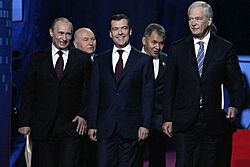
Supreme Council
The Supreme Council has 100 members. It plans the party's long-term goals and helps carry out its programs. It also works to make the party more respected in Russia and around the world. Members are chosen from important public figures. The chairman of the Supreme Council is Boris Gryzlov.
General Council
The General Council leads United Russia's activities between congresses. It makes sure all party decisions are followed. It also helps create election plans and guides the party's political work. It has 170 members.
Presidium of the General Council
This group leads the General Council. It manages the party's political activities, from election plans to party rules. It can decide to call special congresses and create new regional branches. Andrey Turchak was re-elected as the Secretary of the General Council in December 2021.
Party Central Executive Committee
This is the main executive body. It oversees the work of regional branches. It also organizes party events and works with the United Russia group in the State Duma. Alexander Sidyakin became the head of this committee in December 2021.
Central Control Commission
This commission checks that the party follows its rules. It also reviews the party's money and spending. The chairman of this commission is Irina Yarovaya.
Regional Branches
United Russia has branches in every region of Russia. Each regional branch has its own leaders and committees. These branches are responsible for the party's work in their areas. Since 2019, many regional governors have also become leaders of the party's regional branches.
Party Institutions
Young Guard of United Russia
The Young Guard of United Russia (MGER) is the party's youth group. It was started in November 2005. This group supports the party's goals and helps train future party leaders.
Interregional Conferences
In 2010, United Russia started holding interregional conferences. These meetings focused on improving different regions of Russia. The goal was to create clear plans for each area.
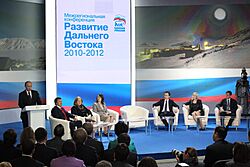
Vladimir Putin, who was then party leader, attended these conferences. He discussed specific projects that could be done quickly. For example, in the Far East, he talked about improving transportation and energy. He suggested lowering flight prices and building new roads.
At a conference in March 2011, Putin asked party members to share their income and expenses. He also told regional leaders to control food prices and help small businesses. In May 2011, Putin suggested creating the Agency for Strategic Initiatives to support new businesses. He also proposed forming the All-Russia People's Front.
Party Finances
The party gets its money from membership fees, government funds, donations, and other activities. Membership fees are voluntary.
Membership fees have not been the party's main source of income. Most of its money comes from donations from companies and government funding. In 2014, government funding for political parties increased a lot. This caused United Russia's income to go up significantly.
In 2015, United Russia received over 5 billion rubles. Most of this came from government funding. The party spent most of its money on running its main offices and regional branches. Some reports have suggested that companies donating to United Russia later received large government contracts.
Party Symbols
The symbol of the party is a walking bear. In 2005, the party changed its symbol to a white bear with a blue outline. Above the bear is a waving Russian flag. Below the bear is the words "United Russia."
Slogans
- "We believe in ourselves and in Russia!" (2003)
- "Russia, forward!", "Let's save and increase!" (2009)
- "Unity, Spirituality, Patriotism" (2010)
- "The future is ours!", "Together we will win!" (2011)
- "To act in the interests of the people is our task", "To hear the voice of everyone is our duty", "To create and protect the future of Russia is our goal", "We made Russia United – Let's make Russia Strong!" (2016)
Internal Groups and Clubs
United Russia has different groups that discuss policy ideas. These groups are not separate parties but rather internal clubs. They help the party think about different ways to develop Russia.
4 November Club
This club focuses on liberal-conservative ideas. It aims to develop plans for the country and get public support for them. It brings together people from different organizations, thinkers, and journalists. The club works closely with the party but is an independent discussion platform.
Center for Social Conservative Policy
This is a private club that discusses social issues. Its members are connected to the party. Their discussions help shape ideas within United Russia. They invite government officials and experts to their meetings.
State Patriotic Club
This club focuses on national unity and patriotism. It believes that a strong and responsible government is important for democracy and a good economy. It also emphasizes Russia's history and culture. The club has branches in many regions of Russia.
Liberal Club
The Liberal Club started in 2010. It includes people from business and culture. Its members are part of the party but wanted a place to discuss liberal ideas. They believe in reforms but want to make changes without breaking the existing system.
Party's Group in the State Duma
After the 2003 elections, United Russia gained a very strong majority in the State Duma. This allowed them to pass laws without much opposition. The party's group in the Duma was divided into smaller sections to make it easier to manage.
The book Operation United Russia describes how the party's group in the Duma worked. It says that lawmakers received clear instructions on how to vote. They were given a list of issues with notes on whether to vote "for," "against," or "abstain." This meant there was little need for discussion.
After the 2007 elections, United Russia again had a strong majority. The number of lawmakers in their group was 315. In the 2011 elections, their numbers decreased, but they still had a majority. In the 2016 elections, United Russia won a record 340 seats.
Leadership in the State Duma
Since 2003, the Chairman of the State Duma has been a member of United Russia. These have included Boris Gryzlov, Sergey Naryshkin, and Vyacheslav Volodin. The party also holds other important leadership positions in the Duma.
United Russia has an expert council to help with new laws. This council reviews all ideas from party members before they are presented to the State Duma.
Notable People Who Left the Party
Some well-known people have left United Russia. For example, Yury Luzhkov, a former mayor of Moscow, left the party. He said he was always careful about United Russia because it lacked democratic ways. He felt the party always followed the government's orders without discussion.
Other famous people who left include former governors, a ballerina, and a writer. In some cases, large groups of people also left the party. For example, in 2015, almost a hundred people in Kopeysk left United Russia. They were employees who had not been paid their salaries. In 2021, over 120 employees of a plant in Altai Krai also left the party.
Sanctions
In December 2022, the European Union placed sanctions on United Russia. This was because the EU believed the party supported Russia's actions in Ukraine. As a result, all party assets in the European Union were frozen. Party members were also banned from entering the EU. In February 2023, Canada also added United Russia to its sanctions list.
Important Members
- Vladimir Putin, President of Russia and former chairman of the party.
- Boris Gryzlov, former Interior Minister and Chairman of the Supreme Council of United Russia.
- Vyacheslav Volodin, current Chairman of the State Duma.
- Valentina Matviyenko, current Chairwoman of the Federation Council.
- Sergey Shoygu, current Defence Minister and former leader of the party.
- Dmitry Medvedev, current chairman of the party, former Prime Minister, and former President of Russia.
See also
 In Spanish: Rusia Unida para niños
In Spanish: Rusia Unida para niños
- Belaya Rus
- Russian Unity
- Serbian Progressive Party
- Unity Party (South Ossetia)
 | Aaron Henry |
 | T. R. M. Howard |
 | Jesse Jackson |


